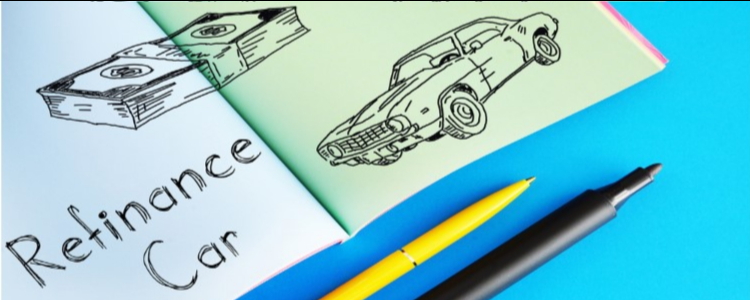Can I Refinance a Car Loan to a Lower Interest Rate?

If you want to lower your interest rate in the middle of your auto loan, then look into refinancing. Refinancing is when you replace your current car loan with another one, and the goal is to do this with more favorable terms that can lower your vehicle payments.
Most borrowers refinance to save money during their loan term or to make their payments more manageable. They often look for another lender to refinance their auto loan.
Borrowers who take out bad credit car loans are commonly assigned higher interest rates due to the lower credit scores they have. However, if you’ve been managing the auto loan well and improved your credit score since the start of it, then you may qualify for refinancing and you could change your interest rate.
Just Got a Car Loan?
If you’re unhappy with the terms of your auto loan, refinancing could be the solution. However, if your car loan is less than one year old, it may not be possible. Most auto lenders don’t refinance car loans right away – typically around 12 months after purchase is when it becomes an option.
If you need to refinance an auto loan right away, or within one year of getting it, you generally need to do some legwork to find a lender that’s willing to refinance your loan early. And to refinance a car loan right away, you’re likely to need a good credit score.
If your credit score is so-so or worse, then expect to wait at least one year before you qualify for refinancing.
Benefits of Refinancing to Lower Your Interest Rate
If you can qualify for refinancing and lower your interest rate, your wallet will thank you later!
Interest charges can add up quickly, especially if you have a high loan balance, a high interest rate, and a longer loan term. Some borrowers find themselves only qualifying for interest rates in the double digits, but if you work hard and repair your credit, qualifying for refinancing could be in your future.
Here’s a quick example of how much your interest rate can impact your overall cost:
Say you financed your vehicle with a 15% interest rate with a loan amount of $20,000 for 60 months. During those five years, you’re estimated to pay around $8,548 in interest charges.
Now, if you refinance after one year to an interest rate of 10%, you’re around saving $2,307. That’s almost $2,500 back in your pocket, that you didn’t have to shell out to your auto lender.
How Does Auto Loan Refinancing Work?
To refinance, you can either work with your current lender or find another one that can approve you. The refinancing lender pays for your current loan and gives you a new contract with a different interest rate and/or terms.
The goal with refinancing is almost always to lower your monthly payment by either extending your loan term or lowering your interest rate (sometimes both). If you just extend your loan term and keep your current rate, you pay more in interest charges. If you keep the same loan term and lower your interest rate, it saves you money in the long run. If you qualify for both, you may or may not save any money on interest charges – it depends on the terms.
If your goal is to save cash throughout your loan term, you should opt to try and qualify for a lower interest rate. Refinancing to a lower interest rate lowers your monthly payment and saves you in interest charges overall.
Your second option in refinancing is typically to stretch your loan term. This also decreases your monthly payment amount, but it won't save you money in the long run. Adding time to your loan without qualifying for a lower interest rate just makes you accrue more interest charges for longer, meaning your loan becomes more expensive overall.
Since auto loans are almost always simple interest loans, you’re charged interest on the remaining balance of your loan – the more payments you have left, the more you’re going to pay. Sometimes, it may be a good idea to extend your loan term if your car payments are becoming unmanageable. If you can comfortably afford your payment, it’s advised to not extend your loan term if you can help it.
Auto Refinancing Requirements
To refinance your auto loan and aim to lower your interest rate, the biggest thing a refinancing lender is going to check is your credit score. If your credit score hasn’t improved since you first got the loan, then you’re better off waiting a little while until it’s repaired some. The better your credit score, the more chance you have at qualifying for a lower interest rate.
A credit score isn't the only qualification for refinancing, though. Lenders vary, but you’re likely to be asked to meet the following requirements:
- You have a good or better credit score
- Your car loan is at least one year old
- Your vehicle has under 100,000 miles and is less than 10 years old
- You don’t have negative equity
- You don’t owe too little or too much so your loan amount fits the lender's stipulations
- You are and have been, current on your loan payments
When you apply for refinancing, lenders require that you’ve handled the loan well, typically for at least one year. This means making your car payments on time, staying on top of your other finances, and improving your credit score.
If you, your car, or your loan isn’t eligible for refinancing, then it may be time to sell the vehicle.
Picking the Right Time to Refinance
Getting approved for refinancing can be fairly simple, but when do you know the time is right? Well, it depends on a few things.
Typically, around a year or two needs to have gone by before you can qualify for refinancing. Lenders like to see a solid payment history on the loan, and if you're making regular monthly payments, your credit score should be better.
If the necessary time has passed and your credit score has increased, you’re probably in good shape to refinance. In fact, you may be able to get a better interest rate, which reduces your monthly payment and total cost.
Another situation where it can make sense to refinance is if you're struggling to keep up with your monthly payment. In this instance, you could refinance and extend the loan term to make the monthly payment more affordable. However, this increases your total cost in the long run, so you have to be careful. It makes sense if you need the relief, but you should view it as a temporary fix until you get your finances back on track.
Conversely, if you want to shorten your loan term, it's not necessary to refinance. You can simply pay more each month and you save in interest charges and pay off the loan more quickly without having to go through the refinancing process.

Want Another Auto Loan?
If you’re struggling to make payments, or you simply want different loan terms but don’t qualify for refinancing, selling the car may be the next option.
You don’t have to wait until you’ve completed your auto loan to get another vehicle. In fact, trading in your current ride for another is a very common practice. If you take your car to a dealer, any equity that you have in your auto loan can be put toward your next vehicle purchase, acting as a down payment.
When you take your car to a dealership as a trade-in, the dealer appraises it and gives you an offer. The key to successfully trading in your vehicle is making sure your offer is high enough to cover your remaining loan balance.
If you don’t get a high enough offer, you must pay the remaining balance. Once you pay off the loan, the lender removes the lien and transfers the title to the new owner of the car.
Selling the vehicle is one thing – getting approved for another auto loan is its own mountain to climb. If you have poor credit, qualifying for a car loan can be difficult. But there are lenders that can help those with damaged credit.
Ready for Your Next Car Loan?
If you’re ready and gearing up for refinancing, then complete our auto loan refinance form. Our trusted partner will look for a refinancing lender in your area at no cost.
However, not everyone can qualify for refinancing. If you’re worried about being able to afford your vehicle payments, and refinancing was meant to be your solution, then it may be time to trade in your current car for something more affordable.
With bad credit, finding lenders that can work with you can feel impossible, or at the very least, a hassle. Instead of searching all over town for a dealer that has the resources you need, fill out our free auto loan request form.
Here at Auto Credit Express, we’ve created a network of special finance dealerships that stretches across the country. Start looking for the lending options you need without having to leave your house, since we’ll do the searching for you.

















